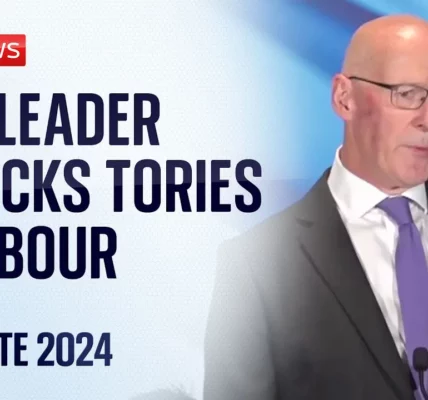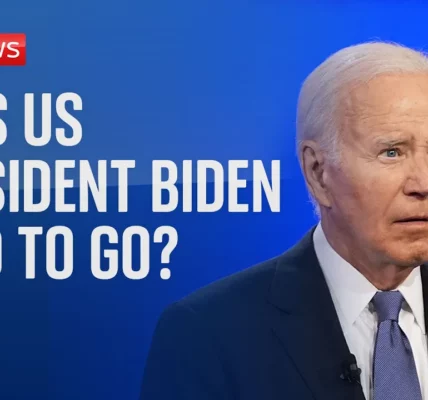Lisa Nandy Discusses Labor’s Policies and Defense Spending Ahead of TV Debate

Join us as we delve into Lisa Nandy’s insights on the Labor Party’s stance on defense spending, the upcoming manifesto, and their commitments to international development and peace processes.
Introduction
In a recent interview, Lisa Nandy, Labor’s Shadow Minister for International Development, addressed critical issues concerning the party’s policies as they prepare for an upcoming TV debate. With a focus on defense spending, the manifesto’s development, and international relations, Nandy emphasized the importance of holding the current government accountable for their decisions. This article explores her remarks in detail, providing insights into Labor’s approach to governance and international affairs.
Accountability and the Prime Minister’s Choices
Nandy began the discussion by addressing the Prime Minister’s early departure from a significant event, commonly referred to as D-Day. She articulated that the Prime Minister must take responsibility for his choices, particularly regarding honoring those who served the nation. This incident raised questions about leadership and the importance of accountability in governance.
Key Points on Accountability
- The importance of honoring veterans and their sacrifices.
- The need for leaders to be present at significant commemorative events.
- The role of public accountability in maintaining trust.
Labor’s Commitment to Defense Spending
One of the focal points of the discussion was Labor’s position on defense spending. Nandy acknowledged the public’s frustration with unfulfilled promises from the Conservative government, especially concerning financial commitments to national security. While Labor did not provide a specific timeline for increasing defense spending to 2.5%, Nandy assured the public of their dedication to a well-funded defense strategy.
Core Principles of Labor’s Defense Policy
- Unwavering commitment to NATO and international alliances.
- Support for a robust nuclear deterrent.
- Comprehensive planning for funding and resource allocation.
Nandy emphasized that any future plans would be thoroughly costed to ensure transparency and accountability.
Manifesto Development and Internal Unity
The development of Labor’s manifesto was described as a positive and constructive process, despite the historical challenges faced within the party. Nandy expressed confidence in the plans laid out for addressing the issues that have plagued the British public over the last 14 years.
Highlights from the Manifesto Meeting
- Consensus on key proposals aimed at transforming the lives of working people.
- Commitment to addressing historical broken promises.
- Focus on creating a sustainable economic future.
Despite some tensions, particularly regarding energy policies, Nandy affirmed the party’s commitment to constructive discussions to ensure a united front.
Transitioning to Clean Energy and Job Creation
Nandy addressed concerns regarding Labor’s plans to ban oil and gas licenses in the North Sea, stressing the importance of a well-managed transition to clean energy. Drawing from historical lessons, she highlighted the necessity of safeguarding workers’ rights and creating new job opportunities in emerging industries.
Strategies for Job Creation
Labor’s manifesto outlines a strategy that includes:
- Investment in clean energy initiatives.
- Creation of well-paid jobs to support local economies.
- Ensuring a just transition for workers affected by the phasing out of fossil fuels.
Nandy emphasized the importance of preparing the workforce for future industries to ensure economic stability.
International Relations and Palestinian Statehood
On the topic of international relations, Nandy reaffirmed Labor’s longstanding position on recognizing Palestinian statehood as part of a peace process. This approach reflects a commitment to meaningful negotiations that respect the rights of all parties involved.
Labor’s Stance on Palestine
Nandy’s comments included a commitment to:
- Supporting a two-state solution that ensures both Israeli and Palestinian rights.
- Working alongside international partners to facilitate meaningful dialogue.
- Prioritizing human rights and dignity for the Palestinian people in diplomatic negotiations.
This commitment aims to usher in a new era of collaboration and respect for human rights.
Conclusion
In summary, Lisa Nandy’s insights during the interview highlighted Labor’s commitment to accountability, defense spending, sustainable energy, and international relations. As the party prepares for the upcoming election, their manifesto aims to address the pressing needs of the British public while fostering a more inclusive and just society. For those interested in following Labor’s progress, consider staying updated on their policies and announcements leading up to the general election.
For more information on Labor’s policies, visit our related articles on defense spending and energy transition strategies.
“`




